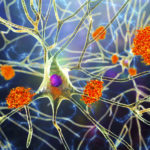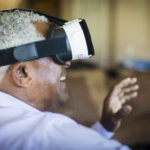Dementia studies
Find out about some of the wide-ranging types of studies available via the Join Dementia Research service.
New Alzheimer’s drug slows cognitive decline by 35 per cent
4 May 2023

A clinical trial has revealed a new Alzheimer’s drug can successfully slow down decline in memory and thinking by 35 per cent. Donanemab has been shown to significantly reduce cognitive decline in people with early-stage Alzheimer’s disease. The trial by US pharmaceutical company Eli Lilly showed it has been successful in removing sticky amyloid plaques […]
Nine in ten people want to know their brain disease risk
20 February 2023

New research has revealed that 91 per cent of people would take a simple test to learn about their risk of developing a brain disease. The anonymous online study, ‘The Global Brain Health Survey’, involved more than 27,500 people worldwide and was led by the Norwegian Institute of Public Health in collaboration with the University […]
Dementia singing study seeks Nottinghamshire volunteers
14 December 2022

A new study in Nottinghamshire is seeking volunteers to form a singing group to study the benefits of singing for people with dementia. University of Nottingham researchers are seeking 80 people with dementia and their carers to take part in the Preliminary Randomised Evaluation of Singing in Dementia (PRESIDE 2024) study, which is using Join […]
Investigating the impact of anti-inflammatory drugs on Alzheimer’s disease
18 October 2022

A research study exploring the impact specialist anti-inflammatory drugs have on Alzheimer’s disease symptoms is looking for volunteers in London, Plymouth, Guildford and Southampton. The EXploratory PLatform trial on Anti-INflammatory agents in Alzheimer’s Disease, or EXPLAIN-AD for short, will be evaluating the effectiveness and safety of anti-inflammatory agents on common Alzheimer’s symptoms – including memory, […]
Diabetes drug to be tested as a potential treatment for Alzheimer’s disease
7 September 2022

Clinical trials across England and Scotland are underway to investigate if an existing diabetes medicine can potentially work as a disease-modifying option for early-stage Alzheimer’s disease. Novo Nordisk is now working alongside Join Dementia Research to investigate if the medicine, known as semaglutide, could also benefit people living with early Alzheimer’s disease. What the study […]
Could an anti-sickness drug treat hallucinations?
16 August 2022

A national research study is investigating whether a readily available anti-sickness drug could treat dementia-related hallucinations. The Trial of Ondansetron as a Parkinson’s HAllucinations Treatment, or TOP HAT study, is recruiting volunteers across England, Scotland and Wales to evaluate whether ondansetron, an anti-sickness drug used in the NHS, could also be used for treating hallucinations […]
Shaping the future of early-stage dementia support
19 July 2022

A pioneering international study is exploring how health promotion and self-management programmes could be used to support people with early-stage dementia and improve their health outcomes. The Self-management and HeAlth Promotion in early-stage dementia with E-learning for carers study, or SHAPE for short, is looking to recruit people with a mild to moderate dementia diagnosis […]
Clinical study to assess potential Alzheimer’s drug
13 July 2022

There are almost one million people with dementia in the UK and the most common cause is Alzheimer’s disease. Researchers from University College London (UCL) with funding from the National Institute for Health and Care Research are testing a new approach to the treatment of mild Alzheimer’s disease in the DESPIAD (DEpletion of SaP in […]
Face to face studies currently open
14 April 2022

After a period of many online studies, we are pleased to share that researchers are increasingly inviting participants to take part in face to face studies. Here are some examples of studies currently looking for volunteers to take part in different parts of the UK: Sleep, gut health and cognition study Insomnia in later life […]
How can virtual reality help with early diagnosis of Alzheimer’s disease?
7 March 2022

Alzheimer’s disease is the most common cause of dementia in the UK and the symptoms develop gradually over many years. Background The symptoms of Alzheimer’s disease can progress slowly and many, such as getting more forgetful, can be attributed to ‘just getting older.’ This can make diagnosis more difficult and currently there is no single […]
